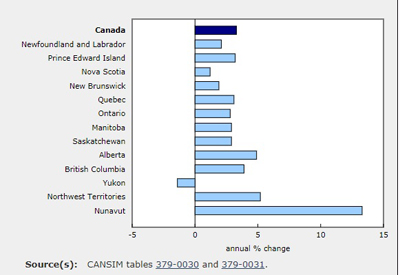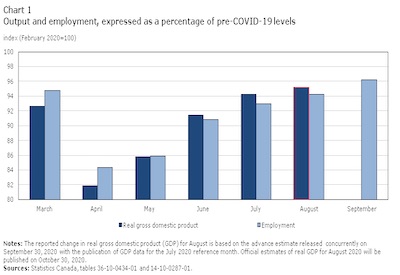Gross Domestic Product by Industry, January 2024
April 1, 2024

Real gross domestic product (GDP) grew 0.6% in January. Services-producing industries increased 0.7% in January, led by a rebound in educational services following the resolution of the public sector strikes in Quebec in November and December. Goods-producing industries were up 0.2% in January 2024 with the utilities and manufacturing sectors rebounding from declines in the previous month. Overall, there was broad-based growth with 18 of 20 sectors increasing in January.
Chart 1
Real gross domestic product rises 0.6% in January
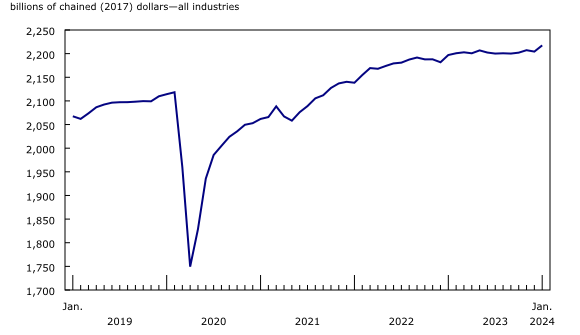
Public sector rebounds from previous two months of declines
The public sector (consisting of educational services, health care and social assistance and public administration) increased 1.9% in January after two consecutive monthly declines.
Chart 2
The educational services sector rebounds in January
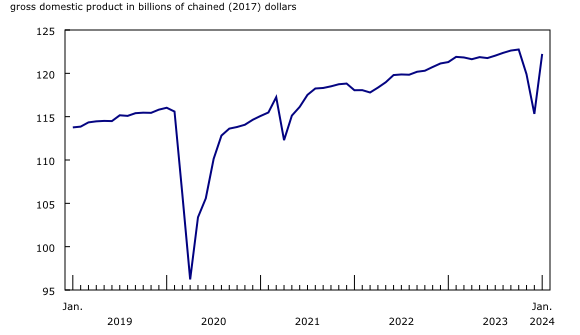
The educational services sector (+6.0%) was the largest contributor to growth in January as activity rebounded from the declines recorded in November and December that resulted from the public sector workers’ strikes in Quebec. The elementary and secondary schools industry group (+10.2%) was the largest contributor to growth in January 2024 after being the largest detractor to growth in December. The beginning of a strike by the Saskatchewan Teachers’ Federation, which represents around 13,500 Saskatchewan teachers, tempered some of the sector’s growth in January.
The health care and social assistance sector, which was also impacted by Quebec’s public sector workers’ strike in November and December, rose 0.8% in January. This was the largest growth rate since October 2020.
Manufacturing fully recoups December’s decline
The manufacturing sector fully recouped December’s decline with a 0.9% increase in January.
Chart 3
Manufacturing sector fully recoups December’s decline
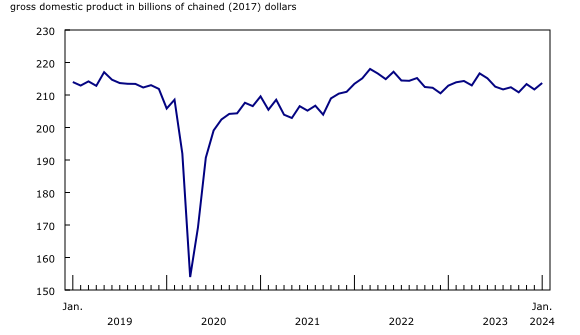
Durable goods manufacturing (+0.9%) contributed the most to the increase in January and was largely a result of an increase in the transportation equipment manufacturing subsector (+3.0%). Following four consecutive monthly declines, the motor vehicle manufacturing industry increased 4.9% in January, as production resumed at some auto assembly plants following retooling-induced partial shutdowns in the previous months. Motor vehicle parts (+3.5%) rebounded as well in January, following a 3.7% drop in December.
Non-durable goods manufacturing increased 1.0% in January as five of nine subsectors expanded.
Utilities up and rail transportation down amid severe winter conditions in parts of the country
A sudden drop in temperatures mid-January in parts of the country contributed to increased activity in the utilities sector (+3.2%), posting its largest growth rate since January 2022. Electric power generation, transmission and distribution expanded 3.4% in January 2024. Surging demand in western parts of the country pushed the generating capacity to the limit and even brought with it a potential of rotating blackouts. Natural gas distribution further contributed to the growth with a 3.4% increase.
Rail transportation fell for the second consecutive month, contracting 4.9% in January, as severe winter weather conditions in Western Canada forced train operators to adjust operations and restrict train lengths to maintain safety.
The mining, quarrying and oil and gas extraction sector contracts in January
Following three consecutive monthly increases, the mining, quarrying and oil and gas extraction sector declined 1.9% in January, as two of three subsectors contracted.
Oil and gas extraction dropped 4.4% in January, after reaching a record high level the month prior. Production declined as frigid temperatures impacted the Prairies during parts of January.
Oil sands extraction decreased 5.2% in January, the largest monthly contraction since August 2020 (-7.7%), as production of synthetic crude along with crude bitumen extraction in Alberta dropped in January 2024. Oil and gas extraction (except oil sands) contracted 3.6% in January, as lower crude oil extraction in Alberta along with lower production coming from Canada’s North Atlantic coast contributed to the decline.
Pipeline transportation decreased 1.8% in January, its largest contraction since May 2023. Crude oil and other pipeline transportation was down 4.4% in January 2024 as exports to the United States contracted in the month. Pipeline transportation of natural gas was up 0.8%, despite a decrease in storage and exports. Natural gas distribution, particularly to residential consumers, rose in January, as increased demand for heating purposes in parts of the country contributed to the increase.
Mining and quarrying (except oil and gas) declined 0.7% in January after three consecutive months of growth. Coal mining (-14.4%) contributed the most to the decline, with its largest monthly contraction since March 2022. Declines in January 2024 were largely concentrated in mines located in Nova Scotia and Alberta due to factors such as reclamation and a shift from coal to natural gas as input to an electricity generation plant.
The real estate and rental and leasing sector grows on higher resale activity
Real estate and rental and leasing (+0.4%) grew for the third consecutive month, as activity at the offices of real estate agents and brokers (+4.0%) drove the gain in January. Higher activity in the Greater Toronto Area, Hamilton-Burlington and most markets in Ontario’s Greater Golden Horseshoe contributed to the growth.
Information and cultural services
Information and cultural services (+1.0%) grew for the third consecutive month in January and posted its largest growth rate since August 2021.
The motion picture and sound recording industry (+12.0%) contributed the most to the increase in January 2024, as activity continued to ramp up following the end of the Screen Actors Guild – American Federation of Television and Radio Artists (SAG-AFTRA) strike in November. A number of television shows and other productions started or resumed in Toronto and Vancouver areas in the month.
Chart 4
Main industrial sectors’ contribution to the percent change in gross domestic product in January
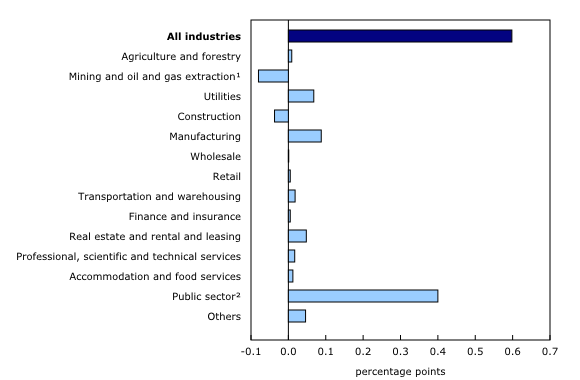
Advance estimate for real gross domestic product by industry for February 2024
Advance information indicates that real GDP rose 0.4% in February. Broad-based increases, with main contributions from mining, quarrying, and oil and gas extraction, manufacturing, and finance and insurance, were partially offset by decreases in utilities. Owing to its preliminary nature, this estimate will be updated on April 30, 2024, with the release of the official GDP by industry data for February.


